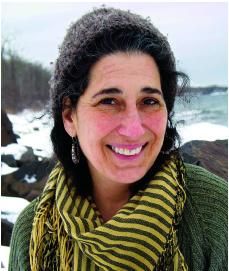Danielle Sosin talks to Colin about setting out to write a novel, Lake Superior's "big juju," and theoretically writing about Hobby Lobby
CGB: You’ve mentioned that The Long-Shining Waters is less a character-driven story than a kind of meditation on place, which is a fascinating project as conceived through the writing of a novel. That said, Lake Superior is a pretty beautiful place to have to spend 400 years in the collective mind of your three characters. Did it have to be the lake? Or are you interested in the idea of place, and places, in general? Could you, in other words, ever write a novel about Hobby Lobby?
DS: I’ve been drawn to Lake Superior’s powers since I was a kid,
so my questions about the mystery of that novel were a natural thing to explore
in a novel. But I am definitely interested in the idea of place. Place is story
after all. Every place has its own archaeology. There is physical evidence of
story left behind, and some places hold psychic
evidence as well. I call it juju for lack of a better word. In those places the
past is palpable. Lake Superior is like that. It has big juju. As for Hobby
Lobby? Theoretically, someone could write a novel about that place. I barely
passed my 7th grade sewing class, so I’m pretty certain it won’t be
me.
Your process of writing this novel initially involved a
great deal of not writing a novel, or rather, not endeavoring to write a novel.
Did that freedom or reluctance stem from your background as a short story writer? And do you think you might approach writing a longer work that
way again? That is, with equal parts excitement and indifference?
After a failed short story, which the novel’s 1622 storyline
grew from, I did set out to try to write a novel. I was just clueless how to go
about it. Still, I was excited by the challenge. Though short stories and
novels are made of the same craft components – character, place, point of view,
theme, plot – there are huge differences in the execution of the craft. A
particular focus and skill is required to bring a work to life for 30 pages
verses 300. It wasn’t indifference I felt at the start of the novel. It was
fear. Embarking on my second novel is as exciting as the first, but still there
is fear. The questions are unanswered and the path is unknown. My dad once told
me that the most important quality in a surgeon was the ability to see
three-dimensionally. Well, probably the most important qualities in a novelist
are the abilities to have faith and endure.
In my mind, a lot of poetry and mystery is set around bodies
of water, I suppose to aid in both the grizzly death scenes and reflections on
solitude, but less commonly fiction. Besides bridging the gap of time and space
between your characters, what did the setting of this novel enable you to say
or think or do?
That’s a big question. The setting of the lake allowed me to
think about connectedness and conductivity. How circular existence is, and how
we all grapple with physical and emotional survival and loss. But mostly the
setting led to more questions and to my pondering the presence of mystery. The
book is largely about the things that we as humans can only know at the edges,
things we intuit about the mysteries of existence.
Along with lists of details and descriptions that would become
your novel, you kept a record of potential titles. Before you settled on The
Long-Shining Waters, did you have a system in mind for eventually winnowing it
down? Pin the tail on the donkey, perhaps? Throwing darts?
Ha! I wish I were capable of that kind of letting go!
Basically I was stumped. For years I was convinced that the word “Superior” had
to be in the title. Well, Superior is a hard word to work with. I kept lists of
potential titles, pages and pages of brainstorming, while using the working
title Superior’s Keep. Finally, I gave up on the word “Superior” and aimed for
a title that would refer to both water and time. More lists. Many more. In the
end, my honey woke up one morning having dreamt the title The Long-Shining
Waters.


No comments:
Post a Comment